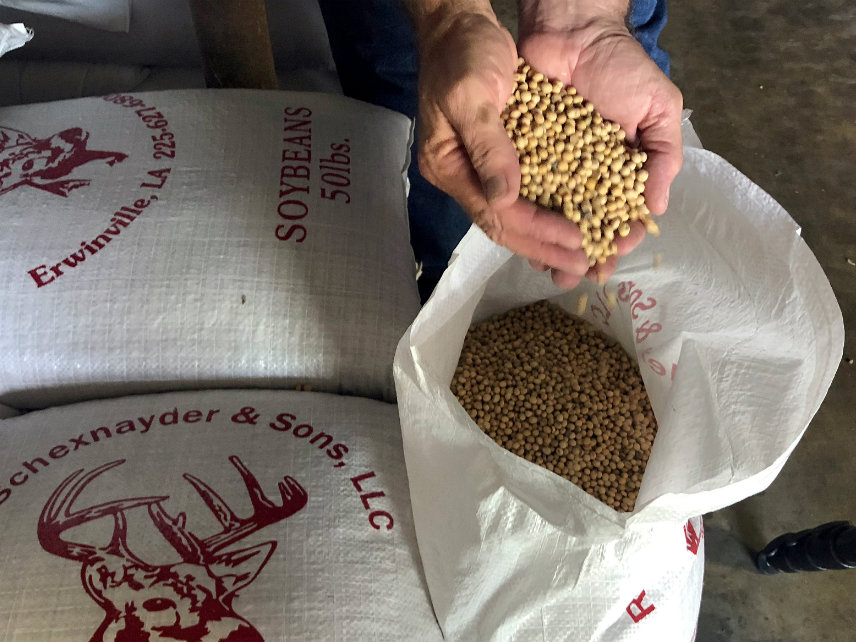Trump's Bailout Won't Save Soybean Farmers
Soybean prices have fallen as much as 30 percent since planting season, and harvest is fast approaching.

At Highland Family Farms in southern Minnesota, Kristin Duncanson and her husband Pat were overseeing the planting of about 3,000 acres of corn, soy beans, and grains when the trade war began.
Since then, the value of those soy beans—which will be ready to harvest within the next few weeks—has plummeted by about 30 percent. Like many farmers across the country, Duncanson is preparing to take a major hit from the tariffs imposed by China this summer, a response to President Donald Trump's decision to slap higher import taxes on $250 billion of Chinese-made goods (along with other tariffs on steel and aluminum imported from a variety of sources).
"We've developed customers in China and we'd like to continue to do business with them," Duncanson told Reason on Tuesday. "Half our crop is soy beans, and that's an important part of how southern Minnesota works. Soy beans are a major crop for us. To have that tariff and have that devaluation is tough."
Farmers have been hit particularly hard by the early stages of the trade war because of how quickly prices can swing in commodities markets. While tariffs have also caused increases in the price of steel, which is passed along the supply chain by steel-consuming industries and eventually to consumers, farmers took a devastating hit from China's tariffs almost immediately. To make matters even worse, surging demand from China led American farms to plant more acres of soybeans than corn this year for the first time ever.
China is the world's largest consumer of soybeans, but tariffs are only part of an overall Chinese strategy to slash consumption of soybeans grown in the United States, which happens to be the world's largest grower of the popular foodstuff. According to Reuters, Chinese officials have outlined a six-part plan to reduce dependence on American soybeans, by taking steps to substitute alternative protein sources like rapeseed or cotton seed for feeding pigs, tapping into a government-run strategic soybean reserve, and boosting imports from Brazil and Argentina.
Meanwhile, the Department of Agriculture says U.S. soybean production in 2018-19 will hit 4.6 billion bushels, an all-time high. Reduced access to Chinese markets will increase the domestic surplus and further depress prices, The Wall Street Journal reported this week.
The surpluses could be sold to Europe—the E.U. announced this week that America is now the leading supplier of soybeans into Europe. Or to Argentina, which is now importing cheaper American soybeans for domestic consumption while selling their own soybeans to China, an arrangement Bloomberg describes as a trade merry-go-round.
Indeed, the Trump administration claimed to have achieved a major victory this summer by inking a "deal" with Europe that would prevent the E.U. from raising tariffs against soybeans—essentially guaranteeing that European markets could be an escape valve for a soybean surplus.
But that's not as much help as the administration might think.
"It really bothers me when they say, 'Well, you're going to sell more commodities than you've ever, ever sold before,'" Zippy Duvall, a Georgia farmer and president of the American Farm Bureau said this week. "Well, yes, if I sell them at a reduced price, I'm no better off. Yes, we'd like to clear them out of inventories, but we still have got to make cost of production to make a living."
In the face of those economic losses, the Trump administration has put forth a plan to subsidize farmers with $12 billion by resurrecting a New Deal-era crop insurance program. Some of those payments have already been made, but there's already indications that it won't be enough to cover all farmers—to say nothing of all the other industries negatively affected by the tariffs, some of which are also making noise about bailouts.
From the perspective of southern Minnesota, Duncanson says the bailouts won't save farms in the long run.
"Granted, that will help pay some bills for some families and get them through for a while, but that's not where we want to be," she says. "We want to participate in the economy just like everyone else, and we want to benefit from trade."


Show Comments (35)